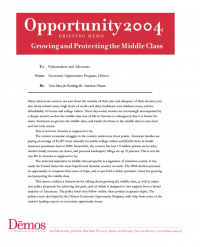Many citizens are anxious not just about the security of their jobs and adequacy of their incomes, but also about related issues: high levels of credit card debt, healthcare and childcare costs, and the affordability of homes and college tuition. These day-to-day worries are increasingly accompanied by a deeper anxiety -- that the middle class way of life in America is endangered; that it is harder for many Americans to get into the middle class, and harder for those in the middle class to stay there and feel truly secure.
This is not how America is supposed to be.
The current economic struggles in the country underscore these points. American families are paying an average of $1,207 more annually for public college tuition and $2,630 more in health insurance premiums than in 2000. Meanwhile, the country has lost 1.9 million private sector jobs, median family incomes are down, and personal bankruptcy filings are up 33 percent. This is not the way life in America is supposed to be.
The universal aspiration to middle class prosperity is a signature of American society. It has made the United States the most hopeful and dynamic country on earth. The 2004 election presents an opportunity to recapture that sense of hope, and to put forth a bold, optimistic vision for growing and protecting the middle class.
This memo outlines a framework for talking about growing the middle class, as well as major new policy proposals for achieving this goal, each of which is designed to win support from a broad majority of Americans. The policy briefs that follow outline these policies in greater depth. The policies were developed by the Demos Economic Opportunity Program, with help from some of the nation's leading experts on economic opportunity issues.
